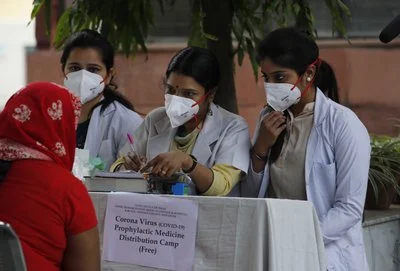By Rosamma Thomas*
On February 17, 2023, the journal Frontiers in Medicine carried an analysis of the reporting of registered Covid-19 clinical trials of Chinese and traditional Indian medicine. The study included research registered on clinical trial registries in India and China before February 10, 2021; almost 34% of all trials registered in China were of traditional medicine, while over 58% of Clinical Trial Registry-India were of traditional systems of medicine.
The need for more rigorous trials and more frequent reporting, even of trials that fail, is underlined by the researchers. This is even more pressing in light of the severe flaws in the global health system, and the manipulation of data and news media that was witnessed during the so-called Covid-19 pandemic. “How were populations cajoled into accepting the official Covid narrative?” asks journalist Colin Todhunter, who reports on an analysis of global data presented by Bhaskaran Raman, associate professor at the Department of Computer Science and Engineering at the Indian Institute of Technology, Bombay, who made a presentation at the Dr DY Patil Medical College, Hospital and Research Centre at Pune.
In March 2023 British Medical Journal reported that patients were suing AstraZeneca over the side-effects of the Covid-19 vaccine. Around 75 claimants – either survivors of the vaccine or those who have lost relatives to it – were part of the legal process.
Given the manipulation of the media and the preponderance of the pharmaceutical industry even in the clinical trial process, it is even more important that individuals assert their right to decide what is best for their health – a right enshrined in the Nuremburg Code.
---
On February 17, 2023, the journal Frontiers in Medicine carried an analysis of the reporting of registered Covid-19 clinical trials of Chinese and traditional Indian medicine. The study included research registered on clinical trial registries in India and China before February 10, 2021; almost 34% of all trials registered in China were of traditional medicine, while over 58% of Clinical Trial Registry-India were of traditional systems of medicine.
For purposes of comparison, conventional medicine studies from India, China and other countries were considered. Authors Nan Zhao of the School of Nursing of the Nanjing Medical University, China, Kritika Pandey of Integrative Ayurveda Network, Leicester, UK, Skanthesh Lakshmanan of the School of Public Health, Nanjing Medical University, Ran Zhao of the School of Public Health, Gansu University of Traditional Chinese Medicine, China, Jingchun Fan, Evidence-Based Medicine Centre, Tianjin University of Traditional Chinese Medicine and others concluded, through Cox regression analysis traditional medicine trials were less likely to be reported than trials of conventional medicine.
Pharmacological, alternative, dietary, immunological, vaccine, stem cell, digital health, ventilation, physical therapy, behavioural or psychological interventions were studied, and Ayurveda, yoga, naturopathy, Unani, Siddha and homeopathy were considered as part of the Indian registered trials.
This is an interesting piece of research, for the authors have also noted the potential for benefit from traditional medicine for non-severe Covid-19 cases.
Pharmacological, alternative, dietary, immunological, vaccine, stem cell, digital health, ventilation, physical therapy, behavioural or psychological interventions were studied, and Ayurveda, yoga, naturopathy, Unani, Siddha and homeopathy were considered as part of the Indian registered trials.
This is an interesting piece of research, for the authors have also noted the potential for benefit from traditional medicine for non-severe Covid-19 cases.
“The potential benefits of TCM (traditional Chinese medicine) treatments may result from their direct antiviral activities but, arguably more likely, by balancing the immune system and alleviating the harmful cytokine storm,” the researchers note. “We found that registered trials of traditional Indian medicine were more likely to be targeted on non-severe Covid-19 cases or individuals without Covid-19 illness, which might be due to the perceived preventive mechanisms of Ayurvedic formulations.”
What was also interesting was that few of the traditional medicine studies had patients with “severe Covid-19”. About 8% of the trials in both India and China were either abruptly terminated or did not start at all. “Reasons given for not starting or early terminating registered trials included mainly difficulty recruiting participants after suppression of Covid-19 outbreaks, availability of new evidence from other research, and possible harmful effects of treatments evaluated.”
There were no proven treatments during the early stage of the so-called pandemic, and healthcare professionals relied on previous experience or repurposed interventions. The researchers note that the traditional medicine trials were often “underpowered, poorly designed, and unlikely to provide valid and relevant evidence.”
Many of the Chinese trials were also retrospectively registered. The researchers also note that pre-print publication of traditional medicine trials is rare; they noted that empirical evidence also indicated “publication related bias where positive or favourable results were more likely to be reported.”The need for more rigorous trials and more frequent reporting, even of trials that fail, is underlined by the researchers. This is even more pressing in light of the severe flaws in the global health system, and the manipulation of data and news media that was witnessed during the so-called Covid-19 pandemic. “How were populations cajoled into accepting the official Covid narrative?” asks journalist Colin Todhunter, who reports on an analysis of global data presented by Bhaskaran Raman, associate professor at the Department of Computer Science and Engineering at the Indian Institute of Technology, Bombay, who made a presentation at the Dr DY Patil Medical College, Hospital and Research Centre at Pune.
In March 2023 British Medical Journal reported that patients were suing AstraZeneca over the side-effects of the Covid-19 vaccine. Around 75 claimants – either survivors of the vaccine or those who have lost relatives to it – were part of the legal process.
Given the manipulation of the media and the preponderance of the pharmaceutical industry even in the clinical trial process, it is even more important that individuals assert their right to decide what is best for their health – a right enshrined in the Nuremburg Code.
---
*Freelance journalist



Comments